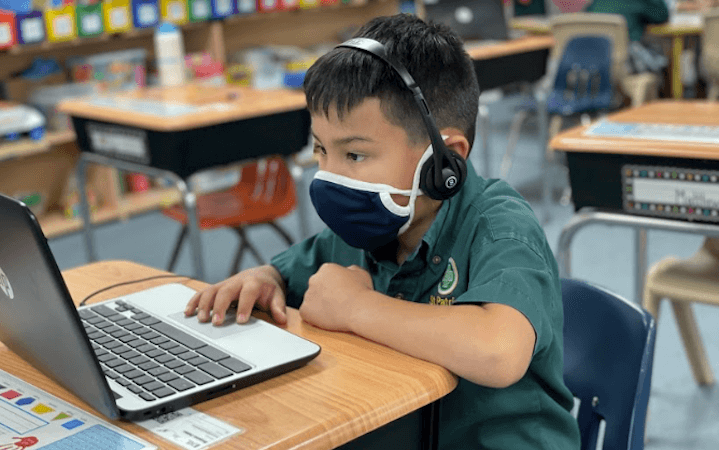If you are a teacher, I'm sure you've heard your students talking (at length) about Among Us, Minecraft, or Fortnite. Games have always been a central fascination of childhood, from hopscotch to Halo. Every one of these games is predicated on challenge; repeatedly trying something you may fail at is the fun. Shouldn't the challenges encountered in the classroom be similarly engrossing? As Higher-Powered Learning director Fr. Nate Wills, CSC, asked in his doctoral dissertation, "Why [is] it not uncommon for kids who can't pay attention to a math worksheet to be immersed in a good video game for 40-50 hours until they beat it?"
The most popular video games are designed around what game makers call Bushnell's Law: "Easy to learn, difficult to master." The designers present challenges at just the right level, and as the challenge is met a slightly more difficult challenge is presented to be conquered. Many games are even adaptive, responding to player inputs and adjusting scaffolds based on performance. (Ever notice how the Mario Kart racers in the rear always seem to get the most useful items?) The player understands what they need to do and feels they can do it given enough time and effort. Contrast this design with the daunting, non-adaptive math worksheet, where students often don't understand what needs to be done and feel like they will never achieve the end goal. Motivation is stonewalled and confidence drops. Educational psychologist Carol Dweck explores the root of these responses to challenge in her book Self-Theories (2000).
In the chapter "When Failure Undermines and When Failure Motivates," Dweck describes two major mindsets learners have when encountering failure:
"We used the term ‚Äòhelpless' to describe some students' view of failure—the view that once failure occurs, the situation is out of their control and nothing can be done We used the term mastery-oriented to refer to the hardy response to failure because here students remain focused on achieving mastery in spite of their present difficulties." (p. 6)
Students with a helpless response pattern toward challenge and failure not only become discouraged by and less focused on future problems, but they also underestimate their true ability and quickly fall into a negative mood. This mindset becomes a pattern, as Dweck writes: "It is also important to realize that the helpless response, if it is a habitual response to a challenge, will not just limit students' achievement of tasks that others give them. It will limit their achievement of their own goals" (p. 13).
By contrast, those with mastery-oriented response patterns do not blame something or someone when they are challenged by a task. They view failure as an expected and necessary part of learning and began self-issuing instructions on approaching the challenge from a new angle. Gamers are used to seeing "Game Over—Play Again?" It is not discouraging; it is simply part of the process of getting better at the game. This mindset must be cultivated in the classroom. Challenge and failure should be presented as simply part of the process of learning. Using educational software makes this even simpler, as it leverages the mastery-oriented responses students already have toward experiences on the computer.
In "What Video Games Have to Teach Us About Learning and Literacy" (2003), researcher James Paul Gee suggests the mastery-oriented response is seen more in gaming than in the classroom because of the potential social cost of failure. Failure in a game usually has low social or emotional risk; the same cannot often be said of the classroom. The gamer's mindset is to be better than they were, and challenge is their opportunity for self-improvement. Your classroom must be carefully designed to promote the same line of thinking in our students. Through personalized software and pedagogy, blended-learning environments have the potential to allow students to engage in the fun aspects of academic challenge without the social or emotional risks present in most classes.
What can we learn about student response to challenge from games? First, we should present each student with challenges at their just-right level. Guitar Hero isn't engaging if hundreds of notes fly past you while you're learning the basics — it is just frustrating! Second, we must also regularly show that practice and iteration are crucial parts of improvement. The "Play Again?" prompt should be an exciting invitation to improvement, not an admonishment. Our ultimate hope is that a mastery-oriented habit toward learning challenges in the classroom will expand outward to all challenges students come across.
In our next blog, we will look into Dweck's research on the goal-setting behind challenge responses, and why blended-learning pedagogy is particularly helpful in encouraging mastery-oriented responses.
Want future blogs delivered right to your inbox?
 Alliance for Catholic Education
Alliance for Catholic Education
